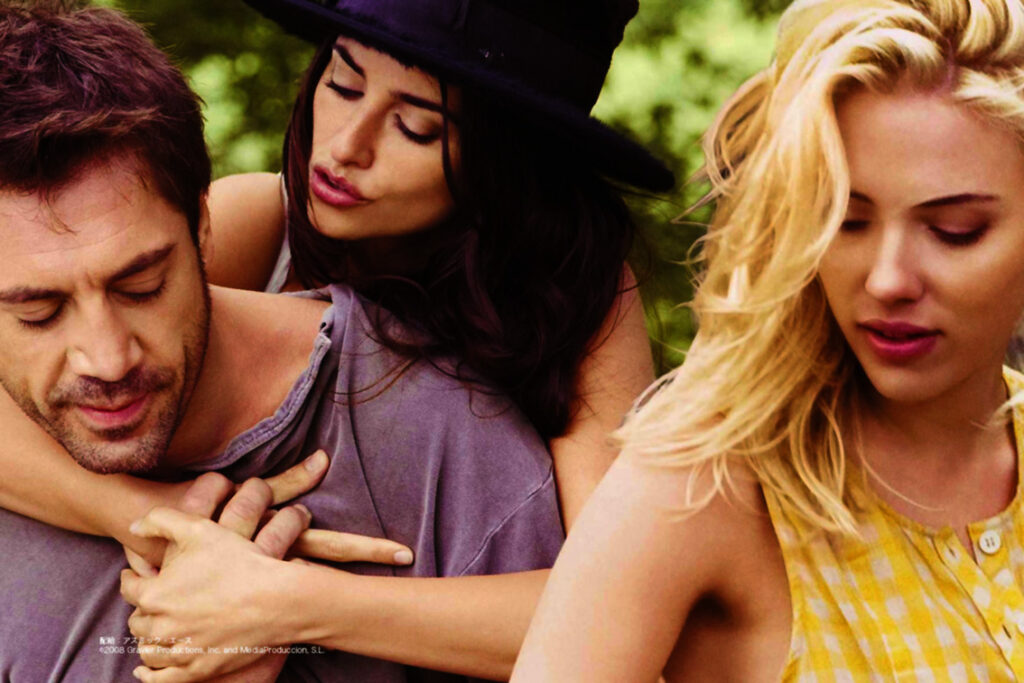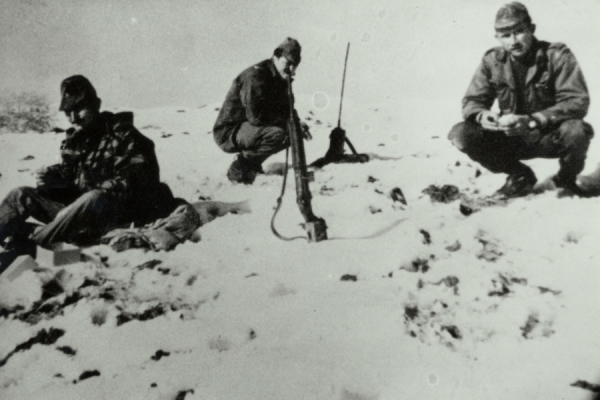Woody Allen was shooting his latest film, Vicky Cristina Barcelona, in Oviedo, Spain when news came that Ingmar Bergman, the filmmaker he most admired, had died. Allen wrote a wry and thoughtful appreciation of the “great cinematic poet of mortality” for the New York Times. Allen, of course, has been worrying out loud about dying his entire life, and, in his piece, he invoked Bergman’s classic black and white film The Seventh Seal, in which a knight, returning from the crusades only to face a plague, challenges Death to a chess match in an attempt to prolong his own life. Bergman, like his Knight, Allen observed, could not put off the ultimate checkmate, nor, as his intellectual friends wanted to believe, would his great art secure for him an afterlife. Allen bet that Bergman would barter each of his great films to buy time to make new ones.
Whether he is right about what Bergman would choose, that seems very much like the bargain that Woody Allen has made, if not with “death” then with the demon of filmmaking. The reputation of his extraordinary films has allowed him to continue making new ones year after year, no matter how slight or lacking in artistic ambition. (Those who enthused about his 2001 Match Point apparently never saw Crimes and Misdemeanors. Allen plagiarized his own film and followed Alfred Hitchcock’s old directorial recipe.) But just when I was prepared to write him off, Allen came up with a film that recalls his rueful comic brilliance and adds something new.
Allen has taken the kind of neurotic New Yorkers he knows, Vicky (Rebecca Hall) and Cristina (Scarlett Johansson), on vacation to Barcelona. His film is a sunlit tourist travelogue of the city of Antoni Gaudí’s architecture and Joan Miró’s art. If you have ever visited Barcelona, you will appreciate the superb selection of art nouveau sights in that remarkable city and the camera angles that so beautifully portray them. Allen described Vicky Cristina Barcelona as his love letter to Barcelona, but if love is a gift, then like all Allen loves, this one got a little complicated. The Spanish production company, with Allen’s help, convinced the city officials to subsidize 10 percent of the film’s budget and to shut down some of the busiest streets for the filming, much to the chagrin of the citizenry who never got anything resembling their idea of a love letter.
But it is not just Allen’s artful cinematic depiction of Barcelona that makes this film worth watching; Allen’s script is engrossing and the actors give marvelous performances. And strikingly, none of the actors are obvious stand-ins for Woody Allen. Since all Allen’s best scripts seem to be an extension of his psychoanalytic introspections, one might wonder if parts of his psyche are hiding in each of the characters. Indeed, when seen from this perspective, the film takes on a deeper and lasting significance.
* * *
Ever since the public scandal about Allen’s relationship with Soon-Yi Previn, his stepdaughter thirty-five years his junior and to whom is now married, it is almost impossible for his devotees not to imagine that something is going on between him and any young actress he works with. This, whatever the truth of the matter may be. When one looks again at his impressive films such as Crimes and Misdemeanors or Manhattan, one cringes with the realization that he was telling us even more than we understood at the time about his relations with under-aged females. On the surface, these films showed us that our hero Woody wanted to enjoy the innocent pleasures of childhood and we could share his pleasure. What we cannot help seeing in hindsight is the perverse Humbert Humbert impulse that sought fulfillment, unsettling even his most devoted admirers. However, Scarlett Johansson, in her third Allen film, does not seem to be his latest nymphet, and her Cristina is not a mindless female object of desire. Allen is not retreading that ground. Allen’s script explores her subjectivity, and, in his slightly mocking style, he empathizes with her. In doing so he perhaps reveals something of his own erotic longings for a transformative love that might make his life fulfilling.
In a rare interview with Vanity Fair as he approached his seventieth birthday in 2005, Allen said his marriage to Soon-Yi had “a paternal feeling to it” and “works like magic.” But it sounded a lot like Allen had given up on the struggle to achieve the magic of love and settled for a manageable relationship. Played out in the characters of Vicky and Cristina, that kind of struggle and compromise suffuses the new film. Scarlett Johansson is no longer the striking beauty she was when she stepped out of the Vermeer painting in Peter Webber’s Girl with a Pearl Earring. In each of the three pictures she has made with Allen he has asked more of her as an actress, and in each her acting has improved; she now looks less like a hot-house flower. As Cristina, she gives a creditable performance in her most difficult role: she is a sophisticated young woman just out of college who spent the last year making a twelve-minute film about love. When it was finished, she hated it. Now at loose ends, she has no idea what she will do with her life. She is open to romance and adventure, but like many women, and certainly those in this film, she worries that romance and conventional marriage do not go together. And she is certain that she does not want a conventional life and a marriage of compromise.
The best Allen comedy shakes you and the characters out of settled beliefs and then allows us all to go reluctantly back to them. His comic heroines try the waters but never take the plunge.
Vicky, Cristina’s best friend, thinks that “romantic love” is the fantasy of unrealistic women who believe Eros will liberate them. She plans on just the kind of manageable relationship Allen has apparently chosen. In the discourse of the era of Herbert Marcuse, Cristina is about Eros and Vicky is about Civilization. Vicky is grounded, engaged to a reliable man who has a good job and adores and respects her. She is looking forward to her conventional marriage. In the meantime she is improving herself by getting a Masters Degree in Catalan studies. When a relative in Barcelona invites her to the heart of Catalonia for the summer, she jumps at the chance and invites Cristina, who has nothing better to do, to accompany her. Barcelona is a legendary city of romance and adventure, so Cristina does not hesitate.
The differences between the young women are central to Allen’s plot. He confronts them with an attractive Spanish artist, Juan Antonio (Javier Bardem). If you have in mind the Javier Bardem who played the monster Anton Chigurh in No Country for Old Men, Allen’s casting might surprise you. But this is the Bardem of Julian Schnabel’s Before Night Falls and John Malkovich’s The Dancer Upstairs: He is handsome, masculine, and sexy, a thoroughly appealing Latin lover who is relentlessly seductive, though he would never force himself upon a woman. Juan Antonio is the man Allen would want to be in his next life.
In an unforgettable moment, Juan Antonio comes over to their table in the restaurant and offers to fly both of women to the beautiful village of Oviedo for a weekend of sightseeing, wine drinking, and love making. Vicky is appropriately shocked, but Cristina is intrigued: this is exactly the kind of adventure to which she was open, and she has already had enough Gaudí and Miró. Juan Antonio leaves the women to argue, and Vicky grudgingly agrees to accompany her adventurous friend—but not, of course, to join them in a threesome. The next scene is vintage Woody Allen. Inside a small plane, Cristina sits happily in the front seat with Juan Antonio who is calmly flying through a lightning storm, as Vicky hangs on for dear life in the back. She did not want to go to Oviedo and now she fears that she is going to get killed flying there on a ridiculous escapade.
The best Allen comedy shakes you and the characters out of settled beliefs and then allows us all to go reluctantly back to them. This film is that kind of comedy. Just as Cristina is about to consummate the liaison, she becomes violently sick to her stomach and is bed-ridden for the rest of the weekend. Juan Antonio, the perfect host, shows the wary Vicky the sights of Oviedo, takes her to visit his father, and to listen to the romantic Spanish guitar music she loves. It is the guitar that finally does it, and the sensible, civilized, engaged-to-be-married Vicky succumbs to Eros. Marriage can never be what she thought she wanted after their night of romantic passion.
She knows she does not want this, but she still does not know what she does want: it can only be Allen’s own ironic conclusion about life.
Vicky is not the only one caught in the struggle between Eros and Civilization. It turns out that Vicky’s host and relative, Judy (Patricia Clarkson), is having her own crisis of love and marriage. She loves her good, reliable husband but she is not in love with him; she is in love with his business partner. As her shrink (this is Allen’s Barcelona after all) tells her, she simply does not have the courage to go for the miracle of love that promises to make her life fulfilling. Judy and Vicky learn each other’s secrets and Judy is determined that the young woman not make the same mistake she did.
Vicky Cristina Barcelona is Allen’s comic version of Anna Karenina or Emma Bovary, the tragic heroines who went for the Eros that promises fulfillment. His comic heroines try the waters but never take the plunge. However, the story goes further, into what can be understood as a roman à clef. There is another complicated love and marriage, this one between Juan Antonio and Maria Elena (Penélope Cruz). They are both artists, and their tempestuous marriage ended in divorce after she stabbed him. Maria Elena has bipolar disorder, and Allen has given Cruz every opportunity to go over the top, taking emotional leaps that even Pedro Almodóvar never allowed her. (Mainstream critics are suggesting that Cruz will get an Oscar nomination for best supporting actress in this film—another sign that Allen is back.) And, indeed, Maria Elena adds a dimension that lifts this film out of shallow waters. Her contribution is not exausted by rants and raves and threats to kill Juan Antonio and his tourist friends. In this roman à clef interpretation of Allen’s script, she is the incarnation of women from his past. Maria Elena claims that she is the real genius and that Juan Antonio stole his art from her. Allen’s telling of this story leads us to believe the claim may well be true in this film and in his life, that the women with whom he struggled (like Louise Lasser, Diane Keaton, and Mia Farrow) also gave him something for which they never got credit.
The film takes another turn when Cristina moves in with Juan Antonio and Maria Elena returns to finally make the threesome. You might think that Cristina had gotten just what she wanted but she stops feeling and starts thinking. She knows she does not want this, but she still does not know what she does want. That pronouncement seems strange coming from her lips: it can only be Allen’s own ironic conclusion about life.
Allen may well despise this reading of his film; it is one thing to parade your own tortured psyche before the camera, but quite another to have a knowing voice expound on its ramifications. My excuse is that only by putting the auteur back in his film can one see its depths and the new, benign Woody—a man resigned to his life, who knows what is missing but does not despair. Vicky Cristina Barcelona does not have a happy ending, but it is an affirmation of humanity, another window into Allen’s comic, rueful world.








